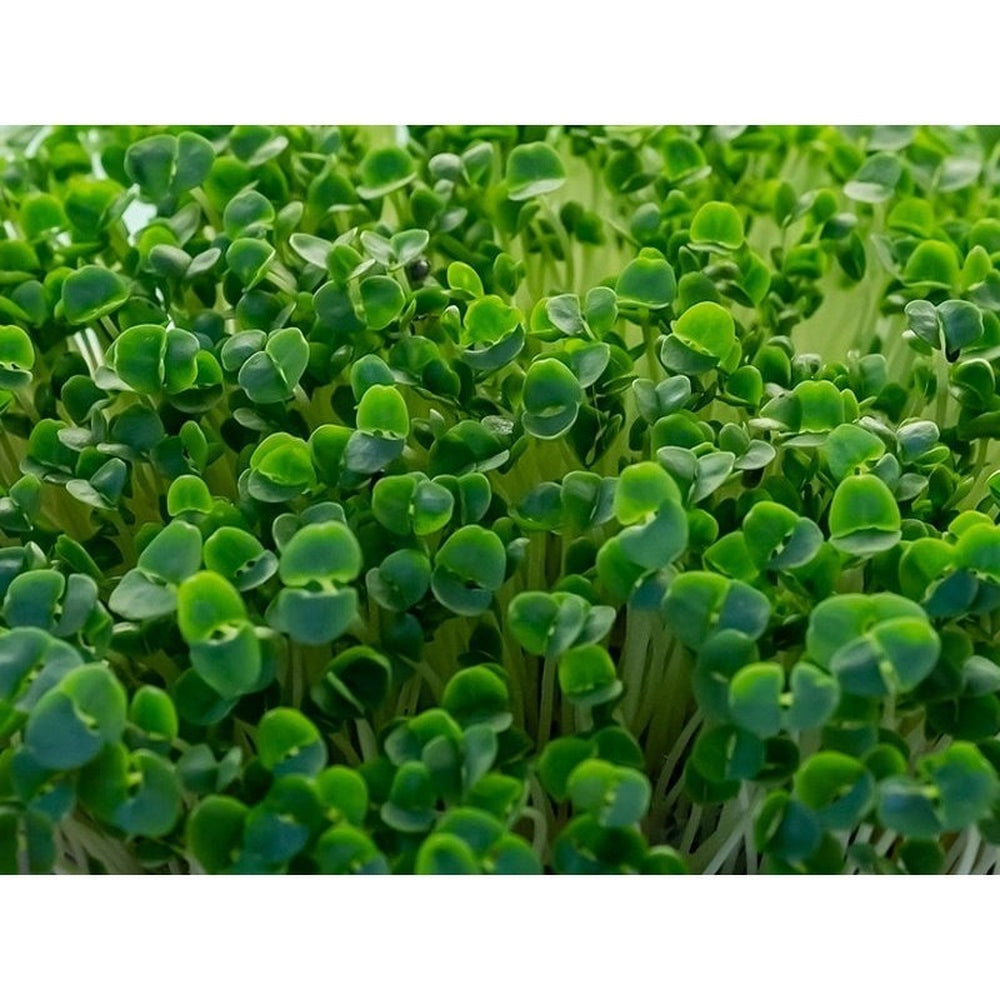Growing microgreens and sprouting are two of the easiest, fastest, and gratifying methods to grow food at home. They have grown in popularity due to their nutritional value, flavour, and texture enhancement to many dishes. You may need a green thumb and space to grow fruits and vegetables, but not for quick growing sprouts!
Basil Microgreens
- Fast growing alternative to mature basil.
- Added nutrition while providing that wonderful basil flavour to dishes.
- 25 x 50 cm tray yields approx. 220 grams.
How to Grow Basil Microgreens:
- Do not pre-soak seeds.
- Sow rate: 28 grams for a 25 x 50 cm growing tray.
- Moisten soil, flatten 3-4 cm soil in tray.
- Cover for 4-6 days with tray lid. Store in well ventilated area away from light until the seeds germinate. Lightly water 1-2 times daily.
- Uncover and place in light. Water 1-2 times daily.
- Harvest time: Approximately 12-16 days.
Basil Seed Details:
- Botanical name: Ocimum Basilicum
- Non-GMO.
- Open-pollinated.
- No chemical treatment.
- Seeds per gram: 600 – 650.
Health Benefits of Microgreens and Sprouts
- Incredibly nutrient dense and low in calories. One study found that "some microgreens contain up to 40 times higher levels of vital nutrients than their mature counterparts" [1].
- Makes seeds easier to digest.
- Essential minerals and nutrients contained within the seeds/legumes become more bioavailable after sprouting (i.e. the nutrients become easier for your body to absorb and use).
- Delicious addition to a salad, sandwich, smoothie or other meal. Add a crunch or a peppery zing depending on the type you choose (see a list of different microgreens/sprouts and their tastes here).
What's the Difference Between Microgreens and Sprouts?
Both microgreens and sprouts are the young shoots of germinated seeds - essentially baby plants. You can grow grains, legumes, nuts and seeds as sprouts or microgreens and people are now fully realising the benefits of eating these young plants.
Sprouts
Sprouts are not grown in soil or other growing mediums, but rather are germinated with only water, usually in a jar, hemp bag, or on a paper towel. They do not need light but require rinsing/misting at least twice per day, are ready to eat in 3-5 days and both the seed and plant are consumed.
Microgreens
Microgreens are grown in soil, a hydroponic growing pad, or in another growing medium such as cocopeat or hemp. They require light, are usually ready to eat in 5-15 days depending on what you're growing and are generally cut off above the soil so only the stems and first leaves (the Cotelydons) are consumed.
For further information see our article - 5 Ways To Grow Microgreens and Sprouts
How to Store Microgreen and Sprouting Seeds
Store seeds in a cool, dry place (under 10°C) or in an airtight container in the fridge. Do not expose to moisture or direct sunlight. Grains, cereals and pulses should be refrigerated.
Some of our Microgreen Seeds
- Snow Pea Oregon Sugar Pod
- Coriander Microgreens
- Beetroot Microgreens
- Basil Microgreens
- Australian Black Sunflower Microgreens
- Broccoli Microgreens
- Green Cabbage Microgreens
- Kale Microgreens
- Mung Microgreens
- Mustard Microgreens
- Radish Daikon Microgreens
Where to Put all your Seeds! - Timber Seeds Box
*** Due to quarantine restrictions we are unable to send seeds to Tasmania or South Australia***


